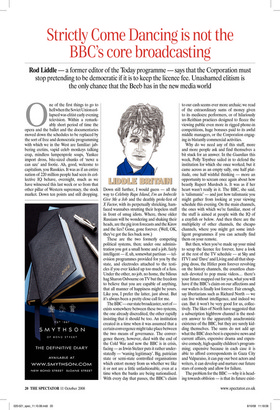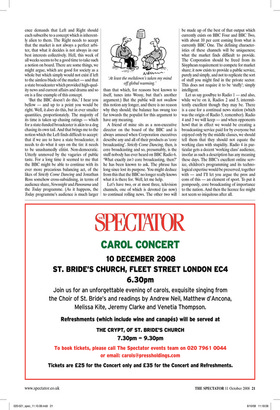Strictly Come Dancing is not the BBC’s core broadcasting
Rod Liddle — a former editor of the Today programme — says that the Corporation must stop pretending to be democratic if it is to keep the licence fee. Unashamed elitism is the only chance that the Beeb has in the new media world One of the first things to go to hell when the Soviet Union collapsed was elitist early evening television. Within a remarkably short period of time the opera and the ballet and the documentaries moved down the schedules to be replaced by the sort of free and democratic programming with which we in the West are familiar: jabbering cretins, vapid celeb monkeys talking crap, mindless lumpenprole soaps, Yankee import dross, bite-sized chunks of ‘newz u can uze’ and footie. Ah, good, welcome to capitalism, you Russkies. It was as if an entire nation of 220 million people had seen its collective IQ behave, overnight, much as we have witnessed this last week or so from that other pillar of Western supremacy, the stock market. Down ten points and still dropping. Down still further, I would guess — all the way to Celebrity Rape Island, I’m an Imbecile Give Me a Job and the deathly prole-fest of X Factor, with its perpetually shrieking, hamfaced wannabes strutting their hopeless stuff in front of smug idiots. Where, those older Russians will be wondering and shaking their heads, are the pig iron forecasts and the Kirov and the lies? Gone, gone forever. (Well, OK, they’ve got the lies back now.) These are the two formerly competing political systems, then; under one administration you got a small home and a job, fairly intelligent — if, uh, somewhat partisan — television programmes provided for you by the state, and electrodes attached to the testicles if you ever kicked up too much of a fuss. Under the other, no job, no home, the bilious hag Sharon Osbourne on TV but the freedom to believe that you are capable of anything, that all manner of happiness might be yours. Like you, I prefer the latter, just about. But it’s always been a pretty close call for me.
The BBC — our state broadcaster, sort of — exists somewhere between these two systems, the one already discredited, the other rapidly insisting that it should be too. An institution created in a time when it was assumed that a certain convergence might take place between the two means of governance. The convergence theory, however, died with the end of the Cold War and now the BBC is in crisis, facing — as Irwin Stelzer puts it rather understatedly — ‘waning legitimacy’. Big, patrician state or semi-state controlled organisations which extort money from us whether we like it or not are a little unfashionable, even at a time when the banks are being nationalised. With every day that passes, the BBC’s claim to our cash seems ever more archaic; we read of the extraordinary sums of money given to its mediocre performers, or of hilariously un-Reithian practices designed to fleece the viewing public even more in rigged phone-in competitions, huge bonuses paid to its awful middle managers, or the Corporation engaging in blatantly commercial activities.
Why do we need any of this stuff, more and more people ask and find themselves a bit stuck for an answer. In the Guardian this week, Polly Toynbee sailed in to defend the institution for which she once worked, but it came across as an empty sally, one half platitude, one half wishful thinking — more an opportunity to scream once again about how beastly Rupert Murdoch is. It was as if her heart wasn’t really in it. The BBC, she said, is ‘talismanic’ — and just how talismanic you might gather from looking at your viewing schedule this evening. On the main channels, the ones with which we’re familiar, most of the stuff is aimed at people with the IQ of a crayfish or below. And then there are the multiplicity of other channels, the cheapo channels, where you might get some intelligent programmes if you can actually find them on your remote.
But then, when you’ve made up your mind to scrap the licence fee forever, have a look at the rest of the TV schedule — at Sky and ITV1 and ‘Dave’ and Living and all that shopping dross, the Hitler porn forever revolving on the history channels, the countless channels devoted to pop music videos... there’s your future mapped out for you, what you will have if the BBC’s claim on our affections and our wallets is finally lost forever. Fair enough, say libertarians such as Richard North — we can live without intelligence, and indeed we can. But it won’t be very good for us, collectively. The likes of North have suggested that a subscription highbrow channel is the modern answer to the apparently anachronistic existence of the BBC, but they are surely kidding themselves. The sums do not add up: what the BBC does best is expensive news and current affairs, expensive drama and expensive comedy, high-quality children’s programming; expensive because in each case it is able to afford correspondents in Gaza City and Valparaiso, it can pay our best actors and writers, it can develop and nurture our future stars of comedy and allow for failure.
The problem for the BBC — why it is heading towards oblivion — is that its future exist ence demands that Left and Right should each subscribe to a concept which is inherently alien to them. The Right needs to accept that the market is not always a perfect arbiter, that what it decides is not always in our best interests collectively. Hell, this week of all weeks seems to be a good time to take such a notion on board. There are some things, we might argue, which are good for society as a whole but which simply would not exist if left to the aimless blade of the market — and that a state broadcaster which provided high-quality news and current affairs and drama and so on is a fine example of this concept.
‘But the BBC doesn’t do this,’ I hear you bellow — and up to a point you would be right. Well, it does do this, but in ever smaller quantities, proportionately. The majority of its time is taken up chasing ratings — which for a state-funded broadcaster is akin to a dog chasing its own tail. And that brings me to the notion which the Left finds difficult to accept: that if we are to have a state broadcaster, it needs to do what it says on the tin: it needs to be unashamedly elitist. Non-democratic. Utterly unmoved by the vagaries of public taste. For a long time it seemed to me that the BBC might be able to continue with its ever more precarious balancing act, of the likes of Strictly Come Dancing and Jonathan Ross somehow cross-subsidising, in terms of audience share, Newsnight and Panorama and the Today programme. (As it happens, the Today programme’s audience is much larger than that which, for reasons best known to itself, tunes into Wossy, but that’s another argument.) But the public will not swallow this notion any longer, and there is no reason why they should; the balance has swung too far towards the populist for this argument to have any meaning.
A friend of mine sits as a non-executive director on the board of the BBC and is always amused when Corporation executives describe any and all of their products as ‘core broadcasting’. Strictly Come Dancing, then, is core broadcasting and so, presumably, is the stuff nobody has ever heard on BBC Radio 6. ‘What exactly isn’t core broadcasting, then?’ he has been known to ask. The phrase has long since lost its purpose. You might deduce from this that the BBC no longer really knows what it is there for. Well, let me help.
Let’s have two, or at most three, television channels, one of which is devoted (as now) to continual rolling news. The other two will be made up of the best of that output which currently exists on BBC Four and BBC Two, with about 10 per cent coming from what is currently BBC One. The defining characteristics of these channels will be uniqueness; what the market finds difficult to provide. The Corporation should be freed from its Sisyphean requirement to compete for market share; it now exists to provide a public service, purely and simply, and not to replicate the sort of stuff you might find in the private sector. This does not require it to be ‘stuffy’; simply intelligent.
Let us say goodbye to Radio 1 — and also, while we’re on it, Radios 2 and 5, intermittently excellent though they may be. There is a case for a continual news station (which was the origin of Radio 5, remember). Radio 4 and 3 we will keep — and when opponents howl that in effect we would be creating a broadcasting service paid for by everyone but enjoyed only by the middle classes, we should tell them that they should not equate the working class with stupidity. Radio 4 in particular gets a decent ‘working class’ audience, insofar as such a description has any meaning these days. The BBC’s excellent online service, children’s programming and its technological expertise would be preserved, together with — and I’ll let you argue the pros and cons of this — an element of sport. To put it pompously, core broadcasting of importance to the nation. And then the licence fee might not seem so iniquitous after all.











































































 Previous page
Previous page